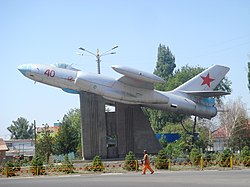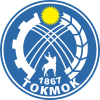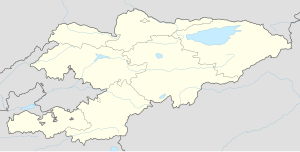Tokmok (Kyrgyz: Токмок, lit. 'hammer'; Russian: Токмак, romanized: Tokmak)[3] is a city in the Chüy Valley, northern Kyrgyzstan, east of the country's capital of Bishkek, with a population of 71,443 in 2021.[2] Its elevation is 816 m above sea level. From 2003 to 2006, it was the administrative seat of Chüy Region.[4][5] Just to the north is the river Chu and the border with Kazakhstan.
Tokmok
| |
|---|---|
 Airplane monument in Tokmok | |
| Coordinates: 42°50′N 75°17′E / 42.833°N 75.283°E | |
| Country | |
| Region | Chüy Region |
| Government | |
| • Mayor | Maksat Nusuvaliev (since May 2023)[1] |
| Area | |
| • Total | 41 km2 (16 sq mi) |
| Elevation | 816 m (2,677 ft) |
| Population (2024)[2] | |
| • Total | 90,467 |
| • Density | 2,200/km2 (5,700/sq mi) |
| Time zone | UTC+6 (KGT) |
| Website | tokmok |
Tokmok was established as a northern military outpost of the Khanate of Kokand c. 1830. Thirty years later, it fell to the Russians who demolished the fort. The modern town was founded in 1864 by Major-General Mikhail Chernyayev.
Tokmok is a district-level city of regional significance within Chüy Region. Although the city is surrounded by the region's Chüy District, it is not a part of it. Its total area is 41 km2 (16 sq mi).[6]


Medieval heritage
editDespite its relatively modern origin, Tokmok stands in the middle of the Chüy Valley, which was a prize sought by many medieval conquerors. The ruins of Ak-Beshim, the capital of the Western Turkic Khaganate, are situated 8 km southwest from Tokmok. Yusuf Has Hajib Balasaguni, author of the Kutadgu Bilig is said to have been born in this area.
About 15 km south of Tokmok is the 11th-century Burana Tower, located on the grounds of an ancient citadel of which today only a large earthen mound remains. This is believed to be the site of the ancient city of Balasagun, founded by the Sogdians and later for some time the capital of the Kara-Khanid empire. A large collection of ancient gravestones and bal-bals is nearby. Excavated Scythian artifacts have been moved to museums in St. Petersburg and Bishkek.
Demographics
editAccording to the Population and Housing Census of 2009, the population of Tokmok was 53,231. The largest ethnic groups in Tokmok are Kyrgyz (46.8%, 2009 census), Russians (20.5%), Dungans (16.5%) and Uzbeks (8.6%).[6]
| Year | Pop. | ±% p.a. |
|---|---|---|
| 1926 | 15,269 | — |
| 1939 | 19,431 | +1.87% |
| 1959 | 26,559 | +1.57% |
| 1970 | 42,116 | +4.28% |
| 1979 | 58,003 | +3.62% |
| 1989 | 72,927 | +2.32% |
| 1999 | 59,409 | −2.03% |
| 2009 | 53,231 | −1.09% |
| 2021 | 71,443 | +2.48% |
| Note: resident population; Sources:[7][8][9][10][6][2] | ||
Geography
editClimate
editTokmok has a hot summer Mediterranean continental climate (Köppen climate classification Dsa). The average annual temperature is 9.5 °C (49.1 °F). The warmest month is July with an average temperature of 23.3 °C (73.9 °F) and the coolest month is January with an average temperature of −5.3 °C (22.5 °F). The average annual precipitation is 434.2mm (17") and has an average of 108.3 days with precipitation. The wettest month is April with an average of 70mm (2.8") of precipitation and the driest month is August with an average of 12.1mm (0.5") of precipitation.[11]
| Climate data for Tokmok (1991-2020) | |||||||||||||
|---|---|---|---|---|---|---|---|---|---|---|---|---|---|
| Month | Jan | Feb | Mar | Apr | May | Jun | Jul | Aug | Sep | Oct | Nov | Dec | Year |
| Daily mean °C (°F) | −2.3 (27.9) |
−0.2 (31.6) |
6.4 (43.5) |
12.9 (55.2) |
17.6 (63.7) |
22.2 (72.0) |
24.5 (76.1) |
23.2 (73.8) |
17.7 (63.9) |
10.9 (51.6) |
4.3 (39.7) |
−0.7 (30.7) |
11.4 (52.5) |
| Average precipitation mm (inches) | 25.2 (0.99) |
27.3 (1.07) |
49.6 (1.95) |
70.0 (2.76) |
68.1 (2.68) |
37.3 (1.47) |
20.2 (0.80) |
12.1 (0.48) |
16.3 (0.64) |
39.7 (1.56) |
41.5 (1.63) |
26.9 (1.06) |
434.2 (17.09) |
| Average precipitation days (≥ 0.1 mm) | 9.0 | 9.3 | 12.0 | 11.8 | 12.4 | 10.2 | 7.6 | 5.5 | 4.9 | 7.7 | 9.2 | 8.7 | 108.3 |
| Average relative humidity (%) | 74.0 | 75.1 | 68.5 | 55.4 | 53.3 | 46.9 | 44.1 | 43.7 | 46.2 | 56.2 | 67.1 | 75.3 | 58.8 |
| Source 1: NOAA[12] | |||||||||||||
| Source 2: "The Climate of Tokmok". Weatherbase. Retrieved 5 August 2014. | |||||||||||||
Industry
editThe glass manufacturer Interglass LLC is based in Tokmok. The Tokmok plant produces about 2,800 tons of liquid glass per day and 600 tons of glass is produced of the mass per day. Annual production is 200 000 tons. At present, raw materials for glass production are mainly provided by Russia and Kazakhstan.[13]
Notable residents
edit- Dmitry Bivol, Russian professional boxer
- Alexander Kosenkow, Olympic German sprinter
- Maiya Maneza, Olympic Kazakh weightlifter
- Jengishbek Nazaraliev, drug rehabilitation professional and politician
- Athanasius Schneider, Kazakh Roman Catholic bishop
- Elihan Tore, president of the First Eastern Turkistan Islamic Republic
- Mátyás Rákosi, Hungary's exiled Stalinist dictator
- Dzhokhar Tsarnaev and Tamerlan Tsarnaev, perpetrators of the Boston Marathon bombing
- Dennis Wolf, German professional bodybuilder
See also
editReferences
edit- ^ PODILSKA, Daria (13 May 2023). "A new mayor of Tokmok has been appointed. It was Maksat Nusuvaliev -". 24.kg (in Russian). Retrieved 20 January 2024.
- ^ a b c "Population of regions, districts, towns, urban-type settlements, rural communities and villages of Kyrgyz Republic" (XLS) (in Russian). National Statistics Committee of the Kyrgyz Republic. 2021. Archived from the original on 10 November 2021.
- ^ Токмак (город в Киргизской ССР) in the Great Soviet Encyclopedia (in Russian) – via Great Scientific Library
- ^ Law 5 March 2003 No. 49
- ^ Law 3 August 2006 No. 146
- ^ a b c "2009 population and housing census of the Kyrgyz Republic: Chüy Region" (PDF) (in Russian). National Statistics Committee of the Kyrgyz Republic. 2010. pp. 13, 16, 56.
- ^ Small Soviet Encyclopedia, vol. 10 (2nd ed.), 1933
- ^ First All-Union Census of the Soviet Union. Kyrgyz ASSR., vol. VIII, 1928
- ^ 1939 census USSR
- ^ 1959 census USSR
- ^ "Climate of Tokmok". Weatherbase.com. Retrieved 5 August 2014.
- ^ "Climate Normals 1991–2020". National Oceanic and Atmospheric Administration. Retrieved 1 November 2023.
- ^ "Kyrgyzstan to Start a 2nd Flat Glass Production Line in Tokmok". The Gazette of Central Asia. Satrapia. 13 November 2012.
External links
edit- Forum Tokmok (Russian)
- Bord Tokmok (Russian)
- Photo Tokmok (Russian)


